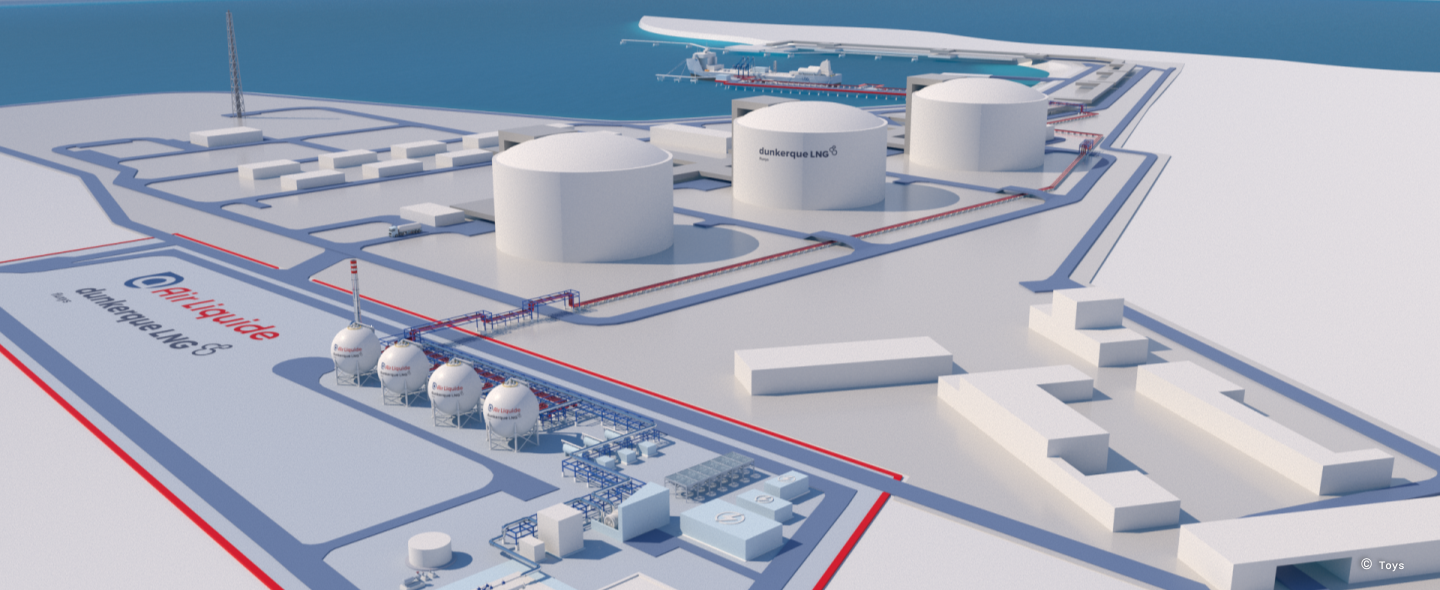Air Liquide and Dunkerque LNG welcome the decision of the European Commission to support the D’Artagnan project. This CO₂ transportation and exportation infrastructure is part of the “Cap Décarbonation” initiative, which aims to reduce CO₂ emissions by 1.5 million tonnes each year in the industrial basin of Dunkirk and its surroundings. The D’Artagnan project will include an Air Liquide pipeline to transport CO₂ from the sites of capture as well as a terminal located in the port of Dunkirk to liquefy and load CO₂ on ships. The first CO₂ infrastructure project in France to receive support from the European Union, D’Artagnan would benefit from a grant of more than 160 million euros as part of the CEF-E (Connecting Europe Facility for Energy) funding program if the project is implemented.
D’Artagnan is the central link of a complete value chain – the “Cap Décarbonation” initiative – which is composed of complementary projects:
- CO₂ capture at Eqiom (cement plant in Lumbres, North of France) and Lhoist (lime production in Réty, North of France), thanks to the implementation of Air Liquide’s CryocapTM proprietary technology, benefiting from the Innovation Fund funding program.
- CO₂ transportation by pipelines and CO₂ exportation terminal – D’Artagnan project.
As part of the D’Artagnan project, the CO₂ captured would be transported by pipelines built and operated by Air Liquide to a new CO₂ terminal in the West Port of Dunkirk, in the proximity of the LNG terminal.
This new terminal, which would be built and operated by Air Liquide and Dunkerque LNG, would receive and liquefy CO₂, for shipment to permanent storage sites in the North Sea. As such, Air Liquide and Dunkerque LNG shareholders formed a joint venture which will benefit from Air Liquide’s expertise in CO₂ management and liquefaction, combined with Dunkerque LNG’s experience in operating terminals. Designed to be open to industrial companies in the region for the transport and shipment of CO₂, this terminal would be able to receive 1.5 million tonnes per year, and, in the future, additional volumes of up to 4 million tonnes of CO₂ per year – equivalent to more than 5% of greenhouse gas emissions from industry in France. It would thus open the way to other CO₂ capture and sequestration projects in the Dunkirk basin.
D’Artagnan would represent an estimated investment of more than 400 million euros and would benefit from a grant of more than 160 million euros as part of the CEF-E (Connecting Europe Facility for Energy) funding program. The investment decision of the project will be linked in particular to the signing of CO₂ management and capture as a service contracts.
The first CO₂ infrastructure project in France to receive support from the European Union, D’Artagnan marks an essential step towards the implementation of the capture and sequestration technologies needed to reduce CO₂ emissions in France and Europe.
These technologies are crucial to significantly reduce CO₂ emissions from industrial sectors producing essential materials (such as cement and lime), whose emissions are in part difficult to reduce because they are inherent to the manufacturing process.
Emilie Mouren-Renouard, member of Air Liquide’s Executive Committee and Chief Executive Officer of the Europe Industries Hub, said:
“Today is the first time that a CO₂ infrastructure project in France receives support from the European Union. Together with our partner Dunkerque LNG we are delighted with this major milestone! Decarbonizing industry will be pivotal to achieving the European Union objective of reducing emissions by 55% by 2030. This is why we are involved in the D’Artagnan project, which is part of the wider “Cap Décarbonation” initiative: bringing our expertise and technologies to help industrial players in the Dunkirk industrial port basin to significantly reduce their CO₂ emissions.”
Olivier Heurtin, Chairman of Dunkerque LNG, added:
“This is an exciting time for the D’Artagnan project. We are celebrating an important milestone. Europe’s support is a testimony to the commitment, expertise and collaborative spirit of all the project partners. Together, we are making a positive impact. With this project, Dunkirk would have its own CO₂ export infrastructure. The first in France. This shows that this project will be a major factor in the competitiveness and attractiveness of Dunkirk and surrounding area. We are enthusiastic and proud to be an essential link in this project, which will benefit the environment, the region and its residents.”

